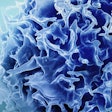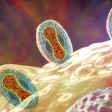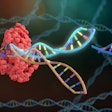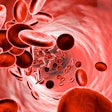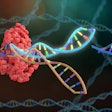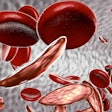
Researchers have engineered a Cas enzyme to enhance activity against RNA viruses, resulting in a system that completely blocked the replication of various SARS-CoV-2 strains.
The research, details of which were published in Cell Discovery, was prompted by the need to overcome a barrier to the use of the Cas13d enzyme as an antiviral against human RNA viruses. Studies have shown that CRISPR/Cas13 systems are programmable tools for manipulating RNAs and Cas13d is the most active subtype of the enzyme in mammalian cells, making it the most promising antiviral candidate.
However, the activity of Cas13d is largely restricted to the nucleus. Most RNA viruses only replicate in the cytosol, where Cas13d is barely active in mammalian cells and as such are protected from the antiviral effects enabled by the enzyme, wrote the study's authors, led by Christoph Gruber of the Technical University of Munich (Cell Discov, April 12, 2024, Vol. 10 [1], pp. 1-4).
The problem led Gruber and other scientists from Helmholtz Munich and the Technical University of Munich to investigate why Cas13d is largely restricted to the nucleus and explore ways to bring the enzyme into contact with replicating RNA viruses in mammalian cells.
The research revealed that the enzyme has little activity in the cytosol because the RNA that guides the CRISPR-Cas complex to specific target sequences is found in the nucleus. That finding led the scientists to explore ways to move CRISPR RNAs (crRNAs) from the nucleus to the cytosol.
Through screening and optimization of various designs of shuttling proteins, the researchers developed a system that transfers nuclear crRNAs into the cytosol. The enzyme -- nucleocytoplasmic shuttling Cas13d or Cas13d-NCS for short -- moves nuclear crRNAs to the cytosol, where the protein/crRNA complex binds and degrades complementary target RNAs.
The researchers hypothesized that Cas13d-NCS more adeptly degrades viral cytosolic RNAs than standard Cas13d and tested that idea using a self-replicating RNA from the Venezuelan equine encephalitis RNA virus. The tests showed the engineered approach "targets solely cytosolic RNA with greater efficiency compared to the current Cas13d system," the authors wrote.
To assess antiviral efficacy, the scientists targeted SARS-CoV-2, the RNA virus that causes COVID-19. The assessment showed Cas13d-NCS can completely block the replication of various SARS-CoV-2 strains, they wrote.
"Targeting conserved but weakly expressed viral-coding sequences resulted in relatively weak inhibition, whereas targeting the ubiquitous 3'UTR with a single crRNA resulted in complete inhibition of viral replication," Gruber et al concluded.









